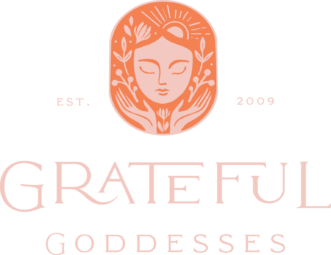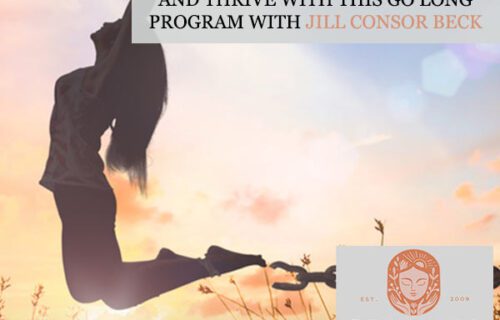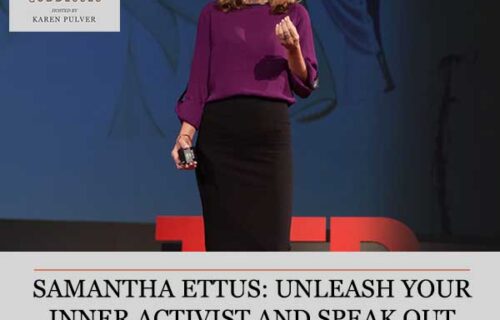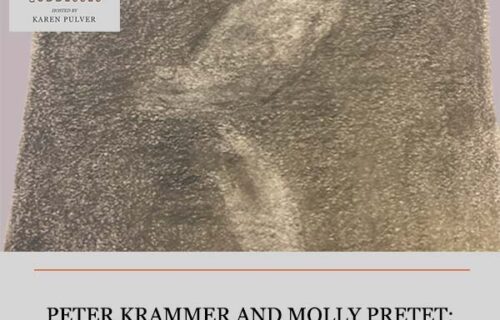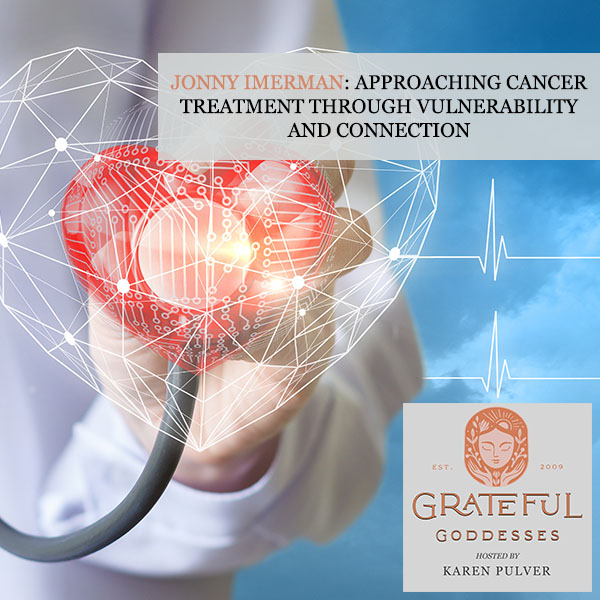
Jonny Imerman: Approaching Cancer Treatment Through Vulnerability And Connection
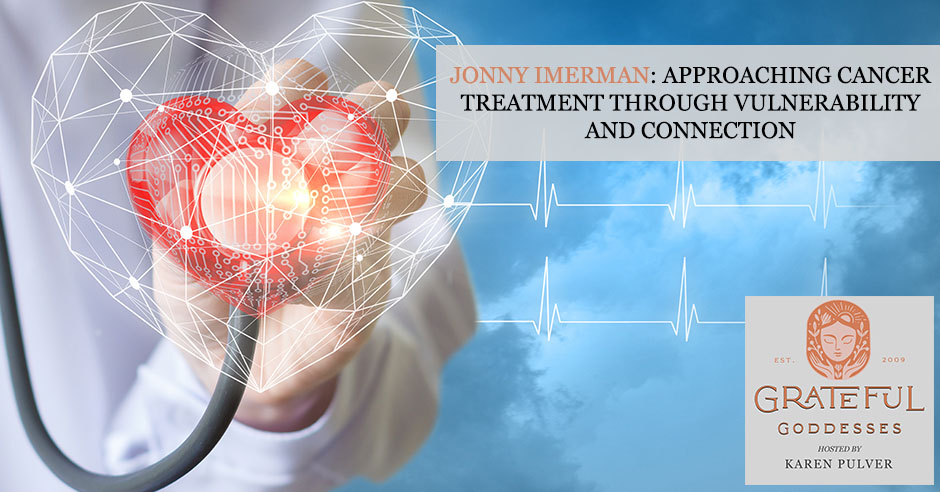
Persistence and resilience are qualities we all have inside of us. It is challenging to bring these qualities out, especially when faced with illness and when having no support. Connection with others is vital to helping individuals deal and better cope with a diagnosis. As my 10-year “Cancerversary” approaches this April 1st, I wanted to air this episode with Guest Goddess Jonny Imerman from Imerman Angels. When I was diagnosed, I was scared, confused, and feeling alone. Even though I had my husband and family to support me, I still felt isolated in my mind as they really didn’t understand what I was going through mentally and physically. They were helpful and comforting but could not relate. What really saved me during this time was Imerman Angels. I was connected to this organization by a friend. I was screened and paired up with several individuals who were just like me—similar cancer, age, children, lifestyle. I was able to really open up and ask all the questions I had to help me deal with this diagnosis, including how to talk to my children, how to prepare for treatment, how to lower stress in my life, as well as just to be a listening ear. My angels were on call 24/7 to help me whenever I needed that support—they were a phone call away. After I was cancer-free for two years, I was able to be an angel myself. I connected with several people and one in particular, who I continue to be friends with today. Join us in conversation with Jonny and Victoria (I’m an angel for) to learn about the importance of teamwork, connection, being vulnerable, and open so we can all help each other to cope. As Jonny says, “by connecting with people and sharing wisdom, we can help to pull them across the finish line so they can win their life back.” Let’s all help each other cross that finish line to win the race!
—
Watch the episode here
Listen to the podcast here
Jonny Imerman: Approaching Cancer Treatment Through Vulnerability And Connection
Thank you for joining us on Grateful Goddesses. We are grateful that you’re here reading the blog. We are still trying to deal with the pandemic of COVID-19. We are having many different things happen outside of our control. I don’t know about you but I have been feeling anxious, depressed at times, sad, and hopeful. There are silver linings, of course, but it’s that feeling of needing connection. If you are someone who has experienced that feeling, then you can relate to what a cancer patient feels.
When you have a diagnosis as I did years ago, for me, I was in perfect health. I was feeling the best that I have felt in a long time. I had been working out seven days a week. I had an amazing career. My kids were getting older. We were having fun in our family. Out of nowhere, cancer hit. I had to stop everything. Even though I had my husband here to support me and my children, my family lived in Canada. I didn’t feel completely connected. I was sad and it was hard. That was missing. I had a whole plan for what it was that I was going to do for treatment. I spoke with my oncologist here in Chicago, who’s amazing, Dr. Winter at Northwestern. I knew what was ahead. I had that under control but I didn’t know if the cancer was going to return. I didn’t know if I would be cancer-free afterward or anything. I needed to speak to someone.
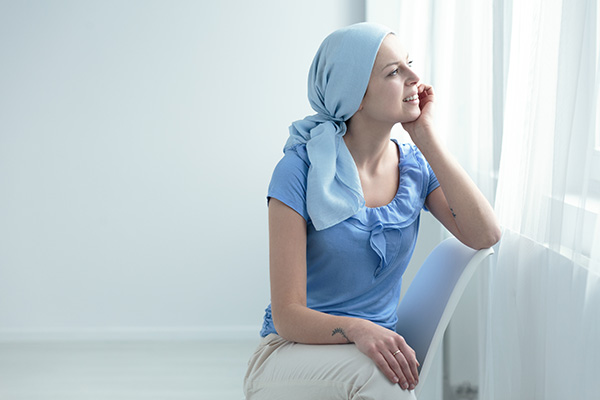
A friend of mine told me about Imerman Angels and she said that I should give them a call. Imerman Angels is an organization founded by Jonny Imerman. While fighting cancer himself at 26 years old, Jonny had loving support from his family and friends like me but he never met anyone his age who was a cancer survivor. He wanted to talk to someone like him. Someone who truly understood and remembered. Someone who had already faced the same type of cancer.
For me, I was facing a similar dilemma. My cancer was B cell non-Hodgkin lymphoma but it was follicular, which means that it originated in my skin in my back. I hadn’t met anyone that had that type of cancer. I didn’t know what was going to happen. Even though I had support, I had people saying, “You’ll be okay. We’re here for you.” I didn’t have that person that could say, “This sucks. This is what you’re going to go through. It’s going to possibly be painful but you’ll get out on the other side.” Imerman Angels provide that gift for cancer fighters.
Imerman Angels introduce each cancer fighter to one survivor who is the same age, same gender, and someone who has already faced that particular type of cancer. A cancer survivor would be an Angel, walking, talking, living proof to inspire the fighter that he and she can overcome their cancer. This was the beginning of Jonny’s vision in 2006 when Imerman Angels was founded. I was grateful to Jonny and Imerman Angels because I was connected to two separate Angels.
At the time I spoke to them, they both had similar cancer to mine. I asked them about how to tell their children. One of the girls that I spoke to was active like I was, working out. I was nervous that I wouldn’t be able to work out again. If you’re physically fit, you like to do that every single day, and that’s going to be taken away from you because your body won’t function the way that it used to, you’d be nervous too. This woman told me she was three years cancer free and she told me that she was back to doing everything that she could do.
Cancer survivors have persistence, resilience, and a community of supporters to help them to never give up! Share on XThe other Angel that I had had children as well. She told me to be honest with them, hold their feelings, talk with them about it, and not be afraid to tell the truth. I was going to sugar-coat it and she said, “Don’t. They need to know exactly how you’re feeling so they can be there to support you as well.” That support was key. It was crucial to me for my mental health. After being cancer-free for two years, I then decided to be an Angel. I am excited because on this episode, along with our guest, Jonny, we also have Victoria. Victoria is a woman that I am an Angel for. We kept our connection. We still speak. We’ve seen each other. She came to my 50th birthday party. We celebrate every year of being cancer-free. I’m cancer-free for almost ten years and she’s cancer-free for almost seven years. We have Victoria as well on the show.
—
Welcome, Jonny, to the show. Jonny, you are our second Goddess guy.
I’m flattered. I’m not that important but I’m on a good team.
A Goddess is a person who has the qualities of passion, determination, persistence, and resilience. Tell us about you. How do you feel about having those qualities?
Thank you, Karen. People like you who help, share your story, and give back are the real champions out there who help through their journey and their experience to give back. I’m a cancer survivor who is blessed. I fought for about two years in my twenties. I had chemo and surgeries for advanced testicular cancer. If I had to pick one word in there that cancer survivors, generally speaking, need to have is persistence and resilience because it is a journey. It is up and down. It is hard. There are days you’re going to cry your eyes out because you’re down, isolated, and scared. I had many of those days. The only way to get through it is to be persistent, resilient, and not give up. You can’t give up. The way to do that is to have a community of also resilient people who love you and care about you, and you love and care about them. If we do this together, that helps us all be resilient and strong.
Being a Grateful Goddess is about connection and support, and we talk about that with our guests all the time. Especially when you’re going through an illness, you need that support. I see you’re wearing your hoodie. Before we get to talking about your journey, how many black t-shirts like that do you own?
I own probably about 25 black T-shirts. In the early days, we learned that we had a few survivors who wanted to give back. We were all grateful. We were in the twenties. We wanted to find purpose and meaning. We created this nonprofit together as a team. It’s a 501(c)(3) called Imerman Angels. It’s free, 100%. If someone has cancer, whatever type it is, wherever they are in the world, we’ll find someone who has already gone through and conquered the same disease, apples-to-apples, who can help that person as a mentor to get through it.
We learned in downtown Chicago that if our friends wore the T-shirt, if we made the T-shirts wearable of higher quality and a little cooler, black and white, gray and white, that color scheme is simple. It was much more popular. The more they wore it, the more people started to ask about it and can be curious. The more the word got out, marketing and branding, and more survivors joined us. We have over 12,000 cancer survivors and mentors who give back in about 100 countries. That’s why we wear the shirt because we realize if somebody is wearing a shirt and someone asked what it is, that’s one more person that’s educated about the mission. They may know somebody who’s sick. They may sell them to somebody who’s a survivor who wants to help somebody who’s sick. If the word gets out, survivors join us, and people that are sick find us, Imerman Angels have a better impact. We can make more one-on-one buddy systems so no one fights the disease alone.
That’s how I met you. I remember I was eating lunch in Chicago, I looked over and I saw. I was an Angel but I didn’t know that you were Jonny. I saw the shirt and I’m like, “Are you a cancer survivor?” You’re like, “I’m Jonny Imerman.” We started talking and it was fun. I could see on your shirt what your mission and your passion. I’d like to invite our featured Goddesses as well as Victoria who I’m an angel for to join us. Alyssa would like to ask you the first question.
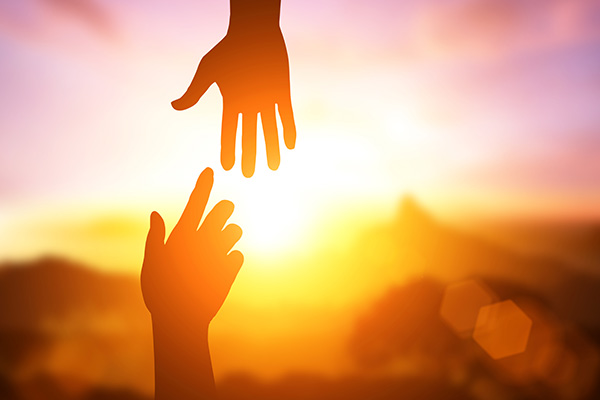
Jonny, I read about your story and I heard a little bit about it. It’s inspirational. I’m curious, can we go back to the beginning of Imerman Angels and in your late twenties? You’re a cancer survivor. I know it was a long journey for you. Was there a pivotal moment where you were like, “A-ha, I have this idea to create this.” Was it more of a process? Can you take us back to how it all got started?
Alyssa, Victoria, Dena, I’m glad you guys are all healthy, number one. I wish everybody well. Dena, it’s great to see you always. Thank you for being a part of this. This mission only works because of all of us. It is the epitome of teamwork. One survivor does nothing but we have over 12,000. It’s amazing what we can do together as a network to find the right person at the right time. Thank you, Alyssa, for your question. It’s a beautiful community. It’s all about community. How it started is with a small group of survivors in Metro Detroit. At the tail end of cancer, we met each other at the hospital. We all became friends. We all wanted to give back and find purpose and meaning.
We said, “We can start going on the weekends. We can go Tuesday after work or Thursday after work. We can go door-to-door and give pump ups, room-by-room, to people that are sick.” What we found is that people trusted us and people connected to us for the simple reason that we’d been there and we had walked through it before. We knew what PICC lines were, catheters, ports, and all that. They couldn’t believe that we were connected to the language. They were starting that first mile of the marathon. That’s the scariest part.
We realize after doing this for years in Metro Detroit that we could scale this. We could get a bigger community that every survivor has the power to share their story. It doesn’t have to be just in Metro Detroit. It can be in London, Japan, Africa, and South America. There are survivors all over the world, tens of millions or probably more. That’s when we started to realize along the way that if we build a community and we get everyone’s story involved, whether you’re a survivor of brain cancer, bone cancer, lung cancer, whatever it is, or you’re a caregiver that you have a kid that’s four years old named Isabel and she is going through leukemia, you know that from a parent’s standpoint or a spouse of somebody who’s sick. If you’re connected to it, we recruit them, and get them on the team, apples-to-apples, when we find people that are sick, let’s line them up in the same scenarios.
It's amazing what we can do together! Share on XDena relates well and her husband goes through cancer. When her husband goes through cancer at a young age and you’re like, “What in the world is happening?” I don’t know any other friends in the 30s that have a husband that’s sick and eventually passes from cancer. Of course, you’re going to be isolated. That’s the whole model. If we look at things globally, it might be somebody in LA, New York, Maine, or London who’s like, “I’m also 37. I’m also a woman. Three years ago, I lost my husband to cancer, I get you and you get me.” They’re farther along. Those two people, we believe, need to be in the same room. That’s why the mission exists. It only works because survivors, family members, people like you guys care, and you’re willing to share the story to help the next person. If they’re not willing to do that, they’re not willing to volunteer, and think it’s not important enough to help somebody else, the reality is it doesn’t work. The idea doesn’t work.
It’s about being vulnerable. You have to be vulnerable to help others and share your story.
Hundred percent. Through that vulnerability which is a great word that you use, that’s how people heal. That’s how I feel I heal. That’s how I feel that many of my best friends who are survivors have healed. It’s being vulnerable and opening yourself up. It’s scary and it’s rough. It’s maybe the hardest point of your life. If you’re able to relive it, to give it, to help the next person blaze the trail for them, give them a connection to someone who empathizes, and gets it, they’re being helped but we’re also healing ourselves. If you guys have done it and shared your stories to help others, you realize everybody benefits. It’s a mutual and beneficial friendship. It’s healing for us but it’s giving the help, That’s the reason we started doing it in the first place.
What were your dreams, hopes, and trajectory before this happened, and then you created Imerman Angels?
I am with my mom. I came from a family where volunteering, giving back, donating, and helping causes were expected. That’s the norm. You didn’t have to do that for a full-time job but you did it at nights and you did it on weekends. You were always giving and helping causes. I did it at nights and weekends. I worked in commercial real estate by day and I always knew it wasn’t the right thing. All of a sudden, at 26 to 28, I got diagnosed. The better part of two years, I moved back into this house. My mom would drive me to chemos eight hours a day, pretty much Monday through Friday, surgeries and all that.
After that experience, which a lot of cancer survivors and people like yourselves, you’ve either gone through it as a caregiver where you know that changeup was super important to you in what you want to do. That’s why I decided to do it full-time. I credit my best friends in Chicago who said, “You could do this full-time. You love this. You’ve been doing it for years in nights and weekends. Why don’t you do what you love?” I never thought about it until my friends pushed me. When they pushed me, you go full-time, and everyone is focused, I feel like that’s when we started to grow and help more people. You can be more focused on doing it full-time. I’ve never regretted that.
We’re on another startup in social impact, which is making these. We brand over 240 nonprofits across the US. We have groups like Feeding America, Stupid Cancer, Muscular Dystrophy Association. We build them free Shopify stores to help their brands get out there. Getting sick put us on a path of saying, “You can work in social impact full-time.” We saw another problem after Imerman Angels, which was the branding of causes. If causes had more branding like Imerman Angels earlier, more people would get help and more donors would support it. More mentors would join us. More survivors would know. More doctors would send patients.
Awareness drives everything that startup entrepreneurial and nonprofits need. We created CLOZTALK to say, “If you work for Imerman Angels, let’s make their swag cooler. Let’s get in on more people. Let’s get the word out for all these great causes so they can do more.” Of course, everything we do is free. It’s for the causes. We never charge the nonprofits. To your question, that’s what got us thinking this could be something full-time and dedicate your life to social impact.
It’s grown exponentially because when you and I were together, it’s been years. I was smaller. It was hard to get somebody that was connected to us then.
By nature, the network is smaller. The matches are not going to be as accurate or as close. What I love about our group is that when Imerman Angels go from 12,000, 22,000, 122,000, to 1 million people, we get better. Teamwork and powers in numbers. You’re drawing from a larger population so your matches are going to be much more similar in terms of age, gender, cancer type, sexual orientation, or race, whatever is important to that family.
It was grassroots. You called me on the phone and you said, “Call this person.”
I still remember it. Liza Slides who I went to college with is fun as hell. She calls me up and tells me, “What’s going on?” We connected. The Detroit Michigan connection between us and met Josh through you. It started right. It was more of friends-of-friends in the beginning. We met you in the early days.
We work in the hospital, checking in, and popping up.
I remember the Fox twins coming to visit you guys. Those guys are great at visiting.
A lot of times people say to me, “What was your silver lining of cancer?” I can look back now and think there are a lot of things that I took from it. In a way, do you feel the silver lining is Imerman Angels that you started?
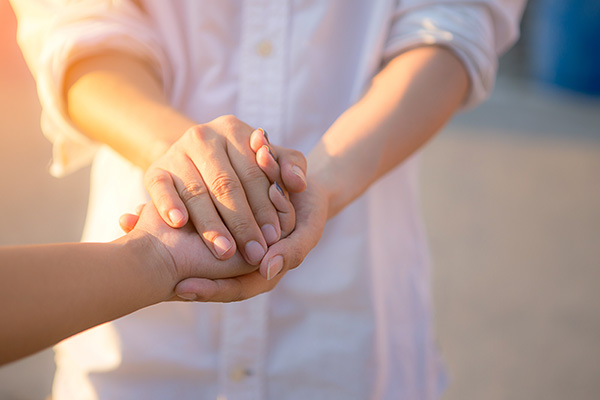
You guys are answers because you are survivors and caregivers. We all agree. There’s a silver lining. Even the friendships right here. You don’t have to go farther than the Zoom. The friendships and the depth of people you get to know through this cancer experience in itself are s the silver lining. I can’t tell you how many of my best friends are survivors. We all care. We all want to give back. We all are always thinking how we can help more people better faster. How can we increase the impact? It’s an incredible community. That’s the best way to say it. The community of people around us who care and self selects those people is a silver lining.
The reality is if none of us were touched by cancer, we wouldn’t know how to help these people. We wouldn’t understand it. We wouldn’t come up with ideas and want to be part of movements like this to do it unless we’ve lived it. It’s the journey, story, and memories as painful as they can be sometimes. It’s those memories and stories and tips we’ve learned along the way, plus friendship given to the next person is truly our value.
Alyssa, do you have another question?
Jonny, there’s so much going on in the world. We’ve got a pandemic, fires in the West, hurricanes in the South, and social injustices that people are fighting for every day. What’s even harder now than in my lifetime, it seems like the hardest is the connection because we’re isolated physically and many times, emotionally. There seems to be this real need for connection. You saw that well over decade. Are you finding it harder now? The survivors, the Angels as well, and those suffering are finding it even harder to make these connections because everything has to be virtual. You can’t sit in the room always with somebody as they’re going through chemo, perhaps if you’re not a family member or otherwise connected. Are you finding that the challenges have increased?
First of all, we all need to acknowledge how difficult the time is for people fighting cancer and then the fears of COVID. There are enough fears of cancers in your body is spreading. We all know what that feels like. In my mind, at least, it spirals out of control, sometimes knowing it’s in your body, spreading, and what’s going to happen. It’s scary in itself. With COVID and then going to a hospital, your spouse, kids, or your best friend can’t even come with you to treatments because you’re limiting people. Talk about disconnection, you’re separating people. You don’t have your support team. I had 7, 8, 10 people in my chemo room for eight hours a day every day like my mom and my brother. I had friends that were residents in Detroit that I grew up with that would stop by and see me. I had all this energy. That couldn’t even happen now.
Our hearts have to go out to the people that are fighting cancer and are worried about COVID. Are they going to get it? Their immune-suppressed already. They can’t have a community. They can’t have their family members with them. As far as I see it, it’s as hard as it gets. I love human beings and I love people. Not being able to connect during COVID is hard for me. There’s no question. I’m not going to complain because there are many people who have it worse, maybe they have cancer plus COVID or another disease plus COVID or they’re older. They know that if they get it, they’re going to be sick with the disconnection and not being able to hug people, touch people, connect, and look in people’s eyes as much. It is a hard time.
I was talking to a friend that I grew up with on a call and we’re both are like, “It’s inhumane. It’s not human to be separated like we are.” Cancer is a time when connection, a hug, love, looking in someone’s eyes knowing they’re there for you matters more than ever. There are many layers of challenges and complexity. The underlying result is a deep disconnection. I’ve talked to a friend for about an hour and twenty who finished an eleven-hour surgery to take four tumors out of his abdomen. He’s 26. He lives in the Detroit area and a great kid. He moved into his mom’s house. He’s doing the same thing I did when I was sick. He’s scared. He’s like, “I’m scared of going back into the hospital, the CAT scans, and the blood tests.” You’re looking at everybody with their masks. Of course, psychology is even more complicated than it is with cancer alone. It’s already complicated with cancer. The connection is one of the biggest challenges that we have.
Being vulnerable, even though it can be rough, scary, and hard, helps other people to heal – both people can be helped together – healing while helping. Share on XVictoria, you have a question. It piggybacks off of Alyssa’s but go ahead.
I could have a two-part question. Jonny, how are you? It’s been a while. I didn’t realize you’re in New York.
I did it under the radar. I’m always coming back to Chicago anyway. I’m zero on social media about it.
When it’s appropriate, I’m here and I would love to try to meet up at some point.
I would love to see all of you, guys. You guys are all great people. I love that you’re taking the time to care about how we’re making cancer look better. Now more than ever with COVID.
My question to you is, now that Stephanie is at the helm, where is your real focus now? I know a part of it but to hear it in your words. The second part is where do you see the future with Imerman Angels? I know that this is a hard time doing virtual fundraising and how you go about this whole process. What’s your vision and how do you see it?
Thank you, Victoria. It’s good to see you. I would love to see you and all of you guys in person. We will again. Life will get back to normal. It’s going to be a while but it’s going to get back to normal. Humans are resilient and persistent like we need to be with cancer. We’re going to get back to some sense of normal of being around each other, hugging each other, and feeling more love in person, which we all crave and need.
I’ll take the second part first about Imerman Angels and where is it going in the future. Stephanie has been incredible. Her mother is a co-founder of Lynn Sage Breast Cancer Center in Chicago and a cancer survivor, Charlene Lieber, who’s amazing. She’s deeply connected to the cancer world in her immediate family for a long time and their continuous work with Lynn Sage. In addition, she spent twenty years in social impact after college at the University of Michigan, and fifteen years working as the Head of Development for the Children’s Museum Chicago at Navy Pier, which is incredible. Her understanding of growing a mission, managing a team, running a board, fundraising events, all that is pretty incredible. We’ve been blessed to have her.
We have shifted to virtual events. We did a virtual 5K that was Steph’s vision and the team’s vision. It blew out what we thought it would be. It doubled. We’ve done six of these virtual 5Ks in person. It was about 1,500 people. It’s in Montrose Harbor. We had 721 people. The numbers went down by half. Our costs are so much lower that the net of what it raised doubled. The online 5K doubled their net. Steph would know the numbers better than me. In my many flaws, this is one of them. The attention to details and numbers is not my thing. It raised $80,000 or $90,000. We more than double that.
Congratulations.
Thank you. It’s Steph. She deserves all that credit. The team and the board stepped up as well. The nine full-time staff worked seven days a week out of love, passion, wanting to help other people, and care about other people. They all deserve the credit, not me. I wasn’t even in the state. It’s all those guys. I will tell you this, it’s going to make other nonprofits rethink this kind of stuff. It’s more than these fitness runs. If you already have momentum shifting to virtual when you lower your costs by so much and people creatively take pictures, post them, and you do a walk in your own neighborhood versus running together even though we don’t have that sense of community together, we can raise more. We can still raise awareness that way, virtually. In that case, with us, it more than doubled.
The gala for Imerman Angels is going to be different. I always want to be optimistic. The gala is on track to do much less than in the past. A fewer people are involved. It’s free. Anyone can go to it. It’s all virtual. It’s 32 minutes. It’s much shorter than a three-hour gala event. The last one was at Morgan Manufacturing. There’s nothing like getting people in the same room and connecting with people. That part, we won’t have. We’re doing our best with virtual.
We hired a great group called Empowered Nonprofits. A friend of mine and Stephanie Lieber, separately, is a wonderful woman named Stefanie Pessis Weil who is amazing. She is a nonprofit consultant. They have Empowered Nonprofits, formerly called Giving Tree Associates. They’re helping us with the virtual piece of it. Sponsorships are way down for this. We’re going to raise a lot less. We’re hoping by making it free. It’s a great call by Stephanie to let people join from Hawaii, California, and New York. We have survivors in 100 countries. It’s free. We hope they do join from all over the world. It’s going to be more of an awareness. We’re going to raise much lower funds, which is okay. We’re going to try to take it day-by-day and figure out how to survive.
That’s why we started it. It was to connect with people. Back to your word, Alyssa, for connection, inspiration, sharing wisdom, feeling like you’re pulling them arm-in-arm across the finish line so they can win their life back. When you lose that and you’re only looking at numbers or board stuff, you’re not talking to the patients. If Stefanie Pessis Weil is not talking to our clients, she wasn’t as happy. It’s important to me too to always be mentoring and have that connection with real people one-on-one. That’s what the organization is about.
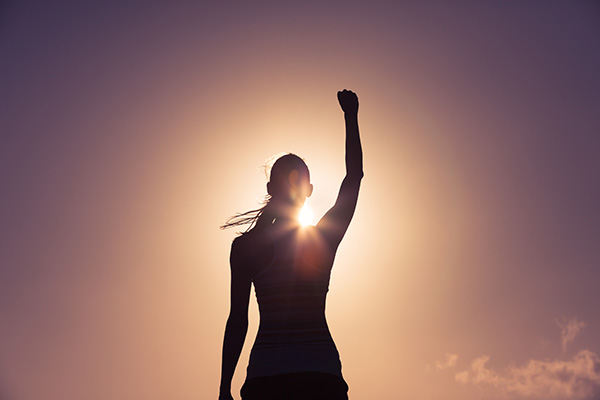
Jonny, is that where you spend your time now? It’s mentoring.
I do. A big percentage of my time is mentoring. Lots of times, friends of friends. Like with Dena, if someone’s sick, they come to me first. I get to know them. I’ll pass them on to the team. We have two full-time social workers that are on the team along with a couple of others that do the matching of our nine people. I’d get them connected to the program team so they can find a better match. Most of the time, it’s random. They don’t have the same cancer even or exactly like them. Let’s get them a survivor that’s apples-to-apples. It’s natural as we all know. When you have that first conversation, sometimes it’s an hour plus and it’s deep. We’ve been there. We all get it. I keep in touch. I’m like a plus one mentor for them.
There’s this particular kid I talked to, which was crazy. Every one of the thousands of cancer people I’ve met along this journey over the years that I’ve been blessed to be a part of, he is, by far, the most similar to my story. We’re laughing about it. We’re like twins. He randomly was introduced to me by another friend of mine in Detroit, a mutual friend. We’re both in our twenties worked in commercial real estate. We both grew up in Metro Detroit. We both got diagnosed 26, 27. We both had roughly stage 3 testicular cancer. We had the same spreading patterns. We went to the same chemo. We both loved tennis. We’re huge tennis players and sports guys.
We both had the rarest thing post-chemo. We both had what’s called teratomas tumors behind our kidneys and had to do this eleven-inch vertical incision on the abdomen to move the organs out of the way, cut out those four tumors, put the organs back in, and stitch it up. He’s nine days out of his surgery. He moved back in with his mom. I moved back in with my mom. He had the same post-chemo RPLND, which stands for Retroperitoneal Lymph Node Dissection surgery. We keep on laughing at how everything is the same. The point in sharing that is the human connection. I know he connects to me so much. He’s like, “Everything you’re telling me about your story is identical to what I’m doing.”
I have the chills. To see that happen and come about is amazing.
We had a connection. We were similar. You did such a great job matching us. We even had the same ring.
We have the same ring too.
What is your favorite thing? It can be a ritual, an item, a product, a color. What is something that brings you happiness and joy?
I want to thank all of you guys. Thank you, Karen and Victoria. The fact that you guys were open to being vulnerable. Your words, Karen, you’re spot on to be vulnerable, have this connection, and reach out to someone who previously is a stranger but now you’re friends and now you’re close. Your experiences are similar. It works. It takes both sides willing to do that. What we need as humans to come together, be vulnerable, and open up. You guys are the reason why it works because you’re willing to connect, you’re willing to share, and willing to help each other. The idea is simple in Imerman Angel. It’s human connection. People have to be willing to open up and willing to do that. The four of you and your openness and embrace of something scary and hard is how we help people. We can’t do it unless people are willing to open up. It’s a good commentary in the world how to bring people together. Being more vulnerable, more open, and less polarized, we know we need that in the world.
It might be Bella. Bella might be a favorite of yours. We always talk about attracting positivity into our lives. When you have cancer, it’s hard to be positive. It’s about being grateful, appreciative, and trying to attract positivity. We talk about things that make us happy, a ritual, a person, an animal, a color, or a product. Is there something in your life that makes you feel a lot of joy and happiness that you can share with us? It’s like a show and tell.
If none of us were touched by cancer, we wouldn't know how to help others. Share on XFirst of all, if you want to meet great people and you want to have good energy yourself, it’s about other people’s great energy. We all absorb each other. The best way to do that is to get involved with the causes. Get involved with any cause that speaks to you like that person. Some of my best friends are board members or colleagues that run great nonprofits. They’re good people. They’re compassionate. They’re kind. They’re honest. They care about people. They’re less materialistic than a lot of other people because they’re happy to show up and happy to wake up. We all understand this. There’s a day when you don’t know if you’re going to be around to see your next birthday.
The secret to being happier, having good energy in your life, and feeling good is to join the causes and join a board. There are many great ones. It doesn’t matter which one it is. The one that speaks to you, volunteer, or go work for one, whatever it is. Be around those people and connect with those people. That’s what gives you positivity. To answer the question, for me, it’s been a wonderful experience. I joke around about it. Being here with my mom who’s single and with these two dogs, Bella and Nick. I’m having family time that. If it weren’t COVID, this wouldn’t be going on. This gives me a lot of love. You feel the love. I’m blessed that I have a family. You feel for the people who don’t.
That is beautiful. If our readers would like to get involved with Imerman Angels, whether to join a board, be an Angel, or reach out, how can they do that?
It’s all free. We’ll always be free. This is a volunteer mission that we’re on here. Any survivor out there who’s been through it, it doesn’t matter what type of cancer or you’re a family member or you’ve been a caregiver, your story matters too. You can go and join us at ImermanAngels.org. If you forget that because that name is hard, I get it. If you can’t remember that, you could type in one-on-one cancer support in Google. Google gives us what’s called Google Grants, which are credit keywords. We get $10,000 in credit keywords, which means we don’t pay. They’re free dollars like Monopoly money that we spend. One-on-one cancer support, we pay for that. We own it.
Anywhere in the world, if you type that in, one-on-one cancer support, Imerman Angels is number one. They do that for us because of the merits of what we do. Google says, “We’re not going to profit off this.” If someone types that in there, this is what they need. Let’s get them to the right place and not charge the nonprofit. That’s great. Anyone who’s sick, if you know someone who’s sick, or you want to get a T-shirt, rock the logo, wear it, and spread the word that will reach other people who are sick, awareness is king. It’s the greatest. That’s what we need. We want to help more people.
Thank you, Jonny, for being our Goddess guy. Like the shirt I’m wearing, kindness is free. You spread kindness and connection, you embody a Grateful Goddess in everything that you do, you are passionate. Jonny, from the bottom of my heart, your organization saved my life.
Thank you.
I was going down a deep hole. Honestly, I needed that connection. I appreciate what you’ve done. Thank you.
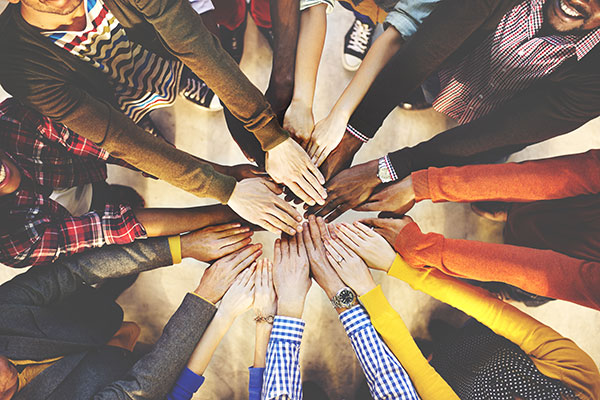
I need to second that because Jonny knows what he did for my entire family and his passion. I can’t even believe it. You were 2 or 3 years in. It’s been years since I lost Josh. He fought for three years. You were a newbie. Kudos to you. Thank you.
Thank you for saying that. I have many great memories of visiting you guys in the hospital. I remember it at Northwestern, 15th or 16th floor.
You’re coming miles away. Jonny was here again.
First of all, thank you guys for the kind words. I’m a regular guy. It’s all of you. It’s the community. It’s teamwork. Our teams found good people to make this mission add value. I’ll be honest, I’ll share that with the team. I’ll send a note. The team, the nine full-timers, that inspires them more than anything to hear what the two of you guys said. Of course, it inspires me and it inspires all of us. It inspires the team to work harder, to care more, and to know what’s working.
They’re humans too. They work seven days a week. They get paid less than the average person in the working world. They do it because they believe and they want to care about their work. They love the people we serve. You never hear it too many times that it’s changed lives. I will share that with the team. It makes them feel good. They deserve it. They work their butts off and they care a lot. It’s a wonderful team. We will only succeed as a team. That is the best example. ithout a team, the whole thing falls apart. With a team, it’s amazing how one at a time, like the two of you and all of you, the lives that we can change. It’s the team working together that gets it done.
Thank you so much, Jonny. We’re grateful for having you. Enjoy your day with your dogs and your mom.
Thank you so much. I look forward to the next time we’re all in the same room.
—
It’s time for Victoria to join us. Victoria has not only been cancer-free but she has taken on a mission to inspire and help others. She has been involved in various charitable organizations for lymphoma and leukemia and she continues to do this. Welcome, Victoria. I am your Angel but you are my angel. Even though we connected years ago, we have stayed in touch and you’ve helped me. It’s been full circle. Can you tell us a little bit about your journey?
My journey started three months after I gave birth to my twin daughters. I had a lump in my groin area and I thought I had a hernia. I come to find out it was follicular lymphoma. At the time of my diagnosis, it was terrifying. We were living in Indianapolis at that time. I truly had no connection to anybody. My close family or friends or anybody wasn’t there. One of my sisters’ friends back in New York told me about Imerman Angels. I filled out the form. The way that we were profiled was unbelievable to me. To this day, it’s truly Godsend to me the way everything came about. It was down to our ring. We came from such similar backgrounds. We’re similar in our personalities and the way we think and the way we look at life and certainly our disease. You have been unbelievably helpful to me and for me throughout this whole journey. We’ve become such good friends. I was at your 50th birthday. We’ve shared many great moments with our husbands and families. I am grateful and thankful for how we’ve come together and been able to be there to support each other. I have my six-month checkup coming up.
You can text me before and after.
I certainly will. It’s been an unbelievable journey. In the beginning, to elaborate on that, I was terrified. I looked at my daughters and I thought that this was it. The first doctor I spoke to told me, originally, I had ten years. It was terrifying. I’m fortunate. I have been on a watch-and-wait program. I have yet to have treatment. If I would have followed the first protocols of the first doctor, I would have had chemo immediately. It’s important to be an advocate for yourself, go out there, and look at different doctors. Those are the things that we discussed. You are a shoulder, direction, and guiding light for me. You helped me think about it differently and gave me support when I feel like there was nobody else I could turn to. It was moving. Thank you.
I’ll never forget that phone call with your mom in the car. I was calming her down. That’s what it is. It’s connection. You helped me. I was talking with Dena that I was paired with someone when I first was diagnosed. I remember it being a quick phone call, talking about a few things, “This is how you talk to your kids. This is what treatment you’re going to have. This is what you’re going to do.” I didn’t feel like I needed to connect with that person anymore. I had another person that I did but then I was done. That’s all I needed at that time. For some reason, you and I connected even more and it’s because our cancer was the same. It’s rare cancer that we have. It’s follicular, which means that it manifests in different areas of your body, unlike the regular B cell non-Hodgkin’s lymphoma. We could share that. Dena, can you talk briefly about your experience with Imerman Angels?
As we heard Jonny, they were grassroots and I was two years in when I was with Jonny. Jonny was being helpful to my family. At that time, the connections were much fewer. He had much fewer to pull from. I spoke to a caregiver. I honestly don’t even remember if Josh used the service at all. They were older. Josh was young. It was rare at the time. It didn’t serve me that connection the way that it does now. What it did do to me was we had access to Jonny and that made all the difference in the world. His personality and vibe and things like that were helpful. I didn’t know much about the caregiver program. It wasn’t that to me.
It may have started a few years ago for caregivers to get support. When I was going through it, there was nothing for caregivers. I’m not sure about you, Victoria, but my husband was having a rough time. He was trying to be strong and trying not to cry every time he saw me bawling. He hold my hands. It’s important to have that support for a caregiver. They started a few years ago.
They started years ago when you and I were here and talking to them a lot about various things that they were doing here in New York. I knew during that time is when they were bringing it in.
Alyssa, I know you’re not part of this cancer club, which I hate to call it that. I’m sure you’re touched by cancer.
A friend of mine has spent the better part of the last eighteen months battling B cell lymphoma. This was pre-COVID. I sat with her in the hospital at Northwestern as she went through chemo. I don’t think that she reached out to Imerman Angels. She had an angel anyway because another friend of ours had gone through cancer. It’s not the same. This other friend had colon cancer, which was detected early but they had a similar treatment. The chemo protocols were similar and that helped her. She was relieved in the beginning that she wasn’t going to lose her hair. There are many other side effects that my friend who had previously gone through treatment was able to share with her, prep her for, how she’s going to feel nauseous, not eat, and not being able to do her yoga, which she loves. That was a roundabout way of saying no, I have not been touched.
Unfortunately, other fatal diseases have touched my family. Being able to sit there with her in the hospital with some other friends, we would laugh, and we kept her distracted. We all brought her fuzzy and warm blankets during her chemo. We’re not able to do that now which is why I wanted Jonny to talk about how difficult it is for people going through it. I like to think that our presence there in the hospital with her. There was an elaborate spreadsheet of who was going. We were making sure there was always a couple of people at each session. Not being able to do that now would be incredibly hard.
Everyone who’s going through COVID can relate to the feeling of not being in control and that’s the feeling you have when you have a diagnosis, your spouse, or family member. You don’t know what to do. You’re isolated. You need support. You need someone to hold your hand to help you through. I want to quickly touch on with Victoria. Not only have you been cancer-free, which congratulations and I’m happy for you, but she has taken this further. She has been involved in some amazing initiatives. Can you talk about that?
I’m doing the Resilience Challenge, which is for blood cancer awareness. What it is we dedicate fifteen miles of something, some form of activity if you will, to raising funds and awareness for blood cancer. I’m doing this with a team in training, which is part of the Leukemia & Lymphoma Society and so far, so good. Every day I keep doing different things. I’ve almost spent my challenge.
Also, you were nominated Woman of the Year. Talk about that.
I was nominated for Woman of the Year which was a twelve-week campaign that we take on to see who can raise the most funds. I raised about $150,000 over the course of twelve weeks. It was quite a journey and an experience. It was exciting. It was tough. It was hard. At the same time, I was training for the team in training a 100-mile bike ride around Lake Tahoe. I was doing both at the same time. The week before the Woman of the Year finale, I was in Lake Tahoe doing the 100-mile bike ride.
You’re the Energizer Bunny. That’s why we connected because we both like to work out. We’re active. You were scared about not being able to do that. It’s important to us. That’s amazing.
It’s important for me to give back and connect. I am always connecting with various people through our community. A newly diagnosed gentleman who I connected with, he’s in his twenties, and trying to guide him through it and then people locally during COVID. I’m always trying to stay in touch and stay strong.
Thank you for coming on and for us being vulnerable, sharing our stories, connecting, and spreading kindness. Anyone can spread kindness even in COVID. It’s a wave. I know we can’t smile through the masks but smile. Your eyes will show it. Connect to anyone that you feel is lonely in any type of illness or any type of situation. Thank you so much.
You’re welcome.
—
Thank you for joining us to Favorite Things. Jonny Imerman, who was with us said his favorite thing is connection, forming a team, smiling, and spreading kindness, which is amazing, and also getting involved in his nonprofit which is helping everyone dealing with feeling isolated with cancer. We’re going to start with Victoria. What did you bring for your favorite thing?
My favorite thing that I go to sleep with every night and I wake up with every day is telling myself five things that I am grateful for around me, my surroundings, the people in my life, and five things about myself. The most important thing is to take care of yourself. We all forget about ourselves. We always are giving to everybody and everything around us. It’s important to take self-care. Start the day off with a smile and tell yourself five things that you are great at for. Whatever it is. I truly try to start my day that way every day and I try to end it that way every day. I am reminded about all the goodness that’s in my life. Therefore, it allows me to give that out to the world.
I used to do that regularly and I put it off for a while. I need to get back on that grateful training, for sure. I’m grateful to you and all of you ladies. Dena, what is your favorite thing?
The secret to being happy and have more energy is to get involved in causes that speak to you, volunteer, be around people, connect! Share on XI hope you guys will check this out if you haven’t already. It is on YouTube. It’s the table read of Fast Times at Ridgemont High with all these fabulous actors and actresses. Have you guys heard of this going around?
I heard Jennifer Aniston and Brad Pitt was on it.
It makes me happy. It takes me back to the 80s. It’s great. Check it out. It’s an hour.
What’s it called, Dena?
It’s called Fast Times at Ridgemont High Virtual Table Read for CORE, which is a nonprofit of some kind.
It’s so much fun. We talked, Victoria, about running out of favorite things but we never will because we will always search for positivity and joy. Alyssa?
Dena, the internet was blowing up about the fact that Tim Branson and Brad Pitt were doing something and reading together. My favorite thing is my gratitude and appreciation for my kids for different reasons. My son was on a college campus and we all know it’s not easy to be on a college campus. It feels like cutting a lot of slack in the news. They’re going out and partying and then COVID is spreading and whatever. It’s not easy.
They’re doing classes virtually. They’re quarantining not only for having COVID but for being within six feet of someone who did. They put them away in these places that are scary, lonely, not feeding them, and providing for them. There was a whole story on The Daily about what it’s like to be quarantined in some of these campuses. I have to say that I feel for them. I’m very grateful to see my son who’s a college sophomore how he is dealing with a unique college experience. It is not easy but he’s being positive. I’m grateful for him and his resilience. My other son who’s living independently grown and flown, out of the nest, and living in his first post-college apartment. It’s not too far away which I’m grateful for. Having found financial independence in a difficult time, I’m grateful for him. They are my favorite things.
What’s interesting about COVID, Victoria and Dena, I’m sure you can relate, is it’s a new normal. For someone with or has cancer, you have to adjust to a new normal quickly. COVID is the same thing. Our kids are having to adjust to this new normal. It’s hard but we can do it with support. I usually don’t bring a product but I love these because my new normal is being comfortable no matter what. I love my slippers. These are the UGG slippers that I wear every day. Sometimes, I forget and I start walking outside with them and my husband is like, “They’re inside slippers. They’re not outside slippers.”
They come in all different colors. They’re warm and fuzzy. They’re great if you’re going to get a pedicure because your toes will stick out. I love them. I’ve been into comfort. I haven’t put on jeans for months and I’m okay with that. COVID-19 is on and I’m alright with it. As Victoria said, it’s taking care of yourself and not being hard on yourself. With cancer, I know I was hard on myself. I’m trying to get everything done. I don’t know about you but I was like, “I’m still going to drive the carpool. I’m still going to make the dinners.” It was hard for me to let go, let people help me, for me to curl up, and take care of myself. From that, I learned that we have to do that even if we’re not sick. Put on those slippers. Put on that rope. Grab your Grateful Goddess mug, enjoy your coffee, feel everything, and be grateful. Thank you for joining us for Favorite Things.
Thank you.
Important Links:
- Imerman Angels
- Feeding America
- Stupid Cancer
- Muscular Dystrophy Association
- CLOZTALK
- Resilience Challenge
- Empowered Nonprofits
- Fast Times at Ridgemont High Virtual Table Read for CORE – YouTube
About Jonny Imerman
 Jonny Imerman is the founder of Imerman Angels. While fighting cancer at 26 years old, Jonny had loving support from family and friends but never met anyone his age who was a cancer survivor. He wanted to talk to someone just like him, someone who truly understood and remembered – someone who had already faced the same type of cancer.
Jonny Imerman is the founder of Imerman Angels. While fighting cancer at 26 years old, Jonny had loving support from family and friends but never met anyone his age who was a cancer survivor. He wanted to talk to someone just like him, someone who truly understood and remembered – someone who had already faced the same type of cancer.
Today, Imerman Angels provide that gift for cancer fighters. Imerman Angels introduces each cancer fighter to one survivor who is the same age, same gender, and someone who has already faced that particular type of cancer.
A cancer survivor would be an angel – walking, talking, living proof to inspire the fighter that he/she can overcome their cancer. This was the beginning of Jonny’s vision. In 2006, Imerman Angels was founded.
Love the show? Subscribe, rate, review, and share!
